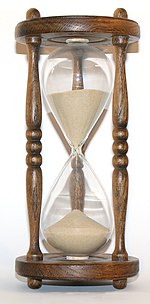Time
From Wikipedia, the free encyclopedia

The flow of
sand in an
hourglass can be used to keep track of elapsed time. It also concretely represents the present as being between the
past and the
future.
Time is a dimension in which events can be ordered from the past through the present into the future,[1][2][3][4][5][6] and also the measure of durations of events and the intervals between them.[3][7][8] Time has long been a major subject of study in religion, philosophy, and science, but defining it in a manner applicable to all fields without circularity has consistently eluded scholars.[3][7][8][9][10][11] Nevertheless, diverse fields such as business, industry, sports, the sciences, music, dance, and the live theater all incorporate some notion of time into their respective measuring systems.[12][13][14] Some simple, relatively uncontroversial definitions of time include "time is what clocks measure"[7][15] and "time is what keeps everything from happening at once".[16][17][18][19]
Two contrasting viewpoints on time divide many prominent philosophers. One view is that time is part of the fundamental structure of the universe—a dimension independent of events, in which events occur in sequence. Sir Isaac Newton subscribed to this realist view, and hence it is sometimes referred to as Newtonian time.[20][21] The opposing view is that time does not refer to any kind of "container" that events and objects "move through", nor to any entity that "flows", but that it is instead part of a fundamental intellectual structure (together with space and number) within which humans sequence and compare events. This second view, in the tradition of Gottfried Leibniz[15] and Immanuel Kant,[22][23] holds that time is neither an event nor a thing, and thus is not itself measurable nor can it be travelled.
Time is one of the seven fundamental physical quantities in the International System of Units. Time is used to define other quantities — such as velocity — so defining time in terms of such quantities would result in circularity of definition.[24] An operational definition of time, wherein one says that observing a certain number of repetitions of one or another standard cyclical event (such as the passage of a free-swinging pendulum) constitutes one standard unit such as the second, is highly useful in the conduct of both advanced experiments and everyday affairs of life. The operational definition leaves aside the question whether there is something called time, apart from the counting activity just mentioned, that flows and that can be measured. Investigations of a single continuum called spacetime bring questions about space into questions about time, questions that have their roots in the works of early students of natural philosophy.
Furthermore, it may be that there is a subjective component to time, but whether or not time itself is "felt", as a sensation or an experience, has never been settled.[3][7][8][25][26]
Temporal measurement has occupied scientists and technologists, and was a prime motivation in navigation and astronomy. Periodic events and periodic motion have long served as standards for units of time. Examples include the apparent motion of the sun across the sky, the phases of the moon, the swing of a pendulum, and the beat of a heart. Currently, the international unit of time, the second, is defined in terms of radiation emitted by caesium atoms (see below). Time is also of significant social importance, having economic value ("time is money") as well as personal value, due to an awareness of the limited time in each day and in human life spans.





